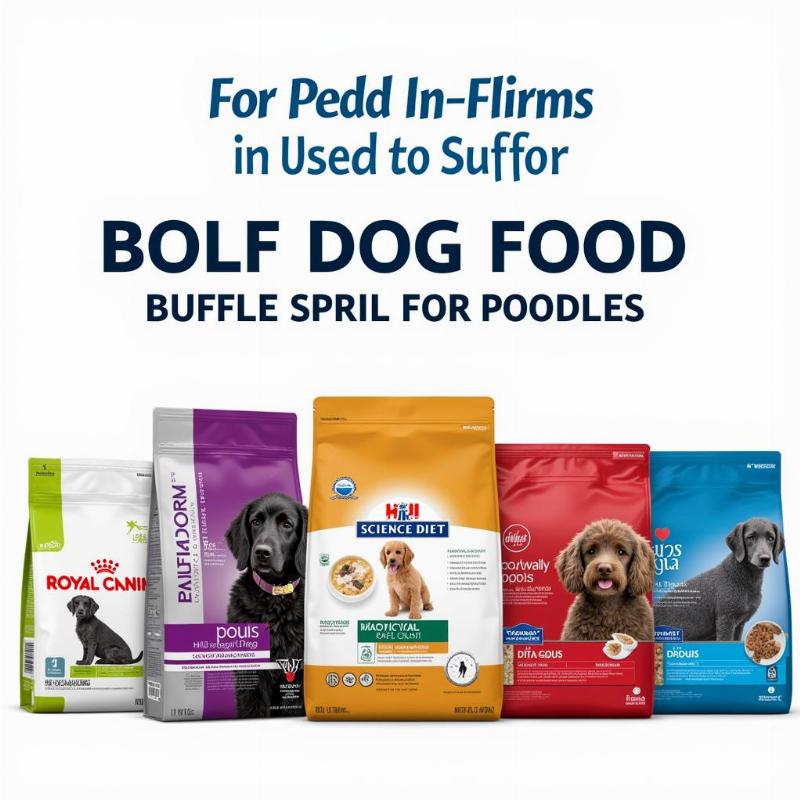Poodles are intelligent, active, and elegant dogs, and their nutritional needs reflect this. Choosing good dog food for poodles isn’t just about filling their bowls; it’s about fueling their bodies and minds for a long, healthy, and happy life. The right diet can significantly impact your poodle’s energy levels, coat health, digestion, and overall well-being. Let’s explore how to choose the best food for your poodle, whether it’s a toy, miniature, or standard size.
Nutritional Needs of Poodles
Poodles, despite their size variations, share similar nutritional needs. They require a diet rich in high-quality protein for muscle development and maintenance. Healthy fats are essential for skin and coat health, giving them that characteristic poodle shine. Carbohydrates provide energy for their active lifestyle, while essential vitamins and minerals support overall health.
What sets poodles apart is their predisposition to certain health issues. They are prone to digestive problems like bloat and sensitive stomachs, so choosing easily digestible food is crucial. They’re also susceptible to skin allergies, making a diet with limited ingredients and no artificial additives a wise choice. Finally, like many breeds, poodles can develop hip dysplasia, so foods that support joint health with ingredients like glucosamine and chondroitin can be beneficial, especially for larger standard poodles.
Choosing the Right Food for Your Poodle
With a plethora of dog food options on the market, selecting the right one can be overwhelming. Here are some key factors to consider when choosing good dog food for poodles:
-
Life Stage: Puppies, adults, and senior poodles have different nutritional requirements. Puppy food is formulated for rapid growth, while senior food caters to the needs of aging dogs. Adult poodles need a balanced diet to maintain their health and activity levels.
-
Breed Size: While the core nutritional needs remain consistent across poodle sizes, the calorie density and kibble size may vary. Toy poodles might benefit from smaller kibble, while standard poodles might require larger pieces. Calorie intake should be adjusted according to their size and activity level.
-
Ingredients: Look for high-quality protein sources like chicken, lamb, fish, or beef as the first ingredients. Avoid fillers like corn, wheat, and soy, which can be difficult for some poodles to digest. Prioritize whole grains, fruits, and vegetables for added nutrients and fiber.
-
Specific Health Concerns: If your poodle has allergies or sensitivities, consider limited ingredient diets or hypoallergenic formulas. If they have joint issues, look for food supplemented with glucosamine and chondroitin. Always consult your veterinarian before making significant dietary changes, especially if your poodle has pre-existing health conditions.
Dry vs. Wet Food for Poodles
Both dry and wet food have their pros and cons. Dry food is generally more affordable, convenient to store, and can help maintain dental health. Wet food, on the other hand, is often more palatable for picky eaters and has higher moisture content, which can be beneficial for poodles prone to urinary tract issues. You can even combine wet and dry food for a balanced approach.
Recommended Dog Food Brands for Poodles
While every dog is different, some brands consistently receive high ratings for their quality and suitability for poodles. These include Royal Canin, Purina Pro Plan, Hill’s Science Diet, and Blue Buffalo. These brands offer a variety of formulas tailored for different life stages, sizes, and specific health needs. Always check the ingredient list and choose a formula that aligns with your poodle’s specific requirements.
 Recommended Dog Food Brands
Recommended Dog Food Brands
Conclusion
Choosing good dog food for poodles is a vital part of responsible pet ownership. By considering your poodle’s individual needs, focusing on high-quality ingredients, and consulting with your veterinarian, you can ensure your poodle receives the nutrition they need to thrive. A healthy diet will contribute to their overall health, longevity, and happiness, allowing them to enjoy their active and intelligent lives to the fullest. Remember, good dog food is an investment in your poodle’s future.
FAQ
- What is the best dry dog food for poodles? There isn’t one “best” brand, but look for high-quality protein, limited fillers, and formulas tailored to your poodle’s age and size.
- Can poodles eat grain-free food? While grain-free can be an option for some, consult your vet as it’s not always necessary and has been linked to potential heart issues in some dogs.
- How much should I feed my poodle? Follow the feeding guidelines on the dog food packaging, but adjust based on your poodle’s activity level and body condition.
- What are signs of food allergies in poodles? Itchy skin, ear infections, digestive upset, and excessive licking can be signs of food allergies.
- Can I give my poodle homemade food? Consult with a veterinary nutritionist to ensure a balanced homemade diet that meets all your poodle’s nutritional needs.
- Is it okay to mix wet and dry food for poodles? Yes, mixing can provide a variety of textures and hydration benefits.
- How often should I change my poodle’s food? Sudden changes can upset their stomach. If switching, gradually introduce the new food over several days.
best dry dog food for skin and coat
best dog food for standard poodles
best dog food for a cockapoo
free service dogs for ms patients
Beautdogs.us is your premier online destination for all things dog-related in the USA. We provide expert advice on dog breeds, care, and products, making us a trusted resource for both new and experienced dog owners. From finding the best dog food for your Poodle to understanding their unique needs, Beautdogs.us offers comprehensive information and resources. Contact us for personalized support at [email protected] or call us at +1 501-555-7529.